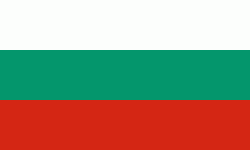Borovo (Borovo)
Borovo (Борово ) is a town in Ruse Province, Northern Bulgaria. It is the administrative centre of the homonymous Borovo Municipality. As of December 2009, the town has a population of 2,330 inhabitants.
The name Borovo comes from the Bulgarian word ‘Bor’ which means ‘pine’ (Бор). The municipality has a temperate climate, with warm summers and cold winters.
Unique objects from a Thracian silver treasure (known as the Borovo Treasure) and a Thracian tomb of c. 4 BC have been discovered on the town's territory. There are evidences of the presence of an old Roman road discovered between the villages of Batin and Gorno Ablanovo near Borovo.
Khristo Markov, who became an Olympic champion in triple jump in 1988, was born in Borovo. Borovo is home to the football/soccer club Vihur (Вихър) (Hurricane), which competes yearly in the Rousse region. The club is over 50 years old. The traditional work of the municipality has centered on the textile industry - there are several big factories manufacturing socks, tights and textile wear.
In this part of Bulgaria are concentrated many clothing factories. These enterprises provide for a considerable number of jobs and form a large part of the local economy. The average salary of those working in the municipality is between 180 – 250 lev a month (or around $120 – $170 /mo.). The major exporters are the firms Elkon (to Belgium), Tri-Co (Finland and Denmark) one of the largest sock producers in Bulgaria, distributes domestically and for export (180 employees) which currently is working with partners from Israel, TIM Bulgaria that manufactures fine stockings and pantyhoses for Europe and Americas and Spiral Ltd. that produces fashion, sporting and textile wear. Other factories in the region are: Cherven 2000, a producer of machines for use in mills (60 employees), Elkon - extension cords and other electronic appliances (50 employees), Stefan Stefanov – KONTEKS - men’s dress shirts for export and domestic use (23 employees), Plamen Penchev - men’s dress shirts for export and domestic use (20 employees)
The name Borovo comes from the Bulgarian word ‘Bor’ which means ‘pine’ (Бор). The municipality has a temperate climate, with warm summers and cold winters.
Unique objects from a Thracian silver treasure (known as the Borovo Treasure) and a Thracian tomb of c. 4 BC have been discovered on the town's territory. There are evidences of the presence of an old Roman road discovered between the villages of Batin and Gorno Ablanovo near Borovo.
Khristo Markov, who became an Olympic champion in triple jump in 1988, was born in Borovo. Borovo is home to the football/soccer club Vihur (Вихър) (Hurricane), which competes yearly in the Rousse region. The club is over 50 years old. The traditional work of the municipality has centered on the textile industry - there are several big factories manufacturing socks, tights and textile wear.
In this part of Bulgaria are concentrated many clothing factories. These enterprises provide for a considerable number of jobs and form a large part of the local economy. The average salary of those working in the municipality is between 180 – 250 lev a month (or around $120 – $170 /mo.). The major exporters are the firms Elkon (to Belgium), Tri-Co (Finland and Denmark) one of the largest sock producers in Bulgaria, distributes domestically and for export (180 employees) which currently is working with partners from Israel, TIM Bulgaria that manufactures fine stockings and pantyhoses for Europe and Americas and Spiral Ltd. that produces fashion, sporting and textile wear. Other factories in the region are: Cherven 2000, a producer of machines for use in mills (60 employees), Elkon - extension cords and other electronic appliances (50 employees), Stefan Stefanov – KONTEKS - men’s dress shirts for export and domestic use (23 employees), Plamen Penchev - men’s dress shirts for export and domestic use (20 employees)
Map - Borovo (Borovo)
Map
Country - Bulgaria
 |
 |
| Flag of Bulgaria | |
One of the earliest societies in the lands of modern-day Bulgaria was the Neolithic Karanovo culture, which dates back to 6,500 BC. In the 6th to 3rd century BC the region was a battleground for ancient Thracians, Persians, Celts and Macedonians; stability came when the Roman Empire conquered the region in AD 45. After the Roman state splintered, tribal invasions in the region resumed. Around the 6th century, these territories were settled by the early Slavs. The Bulgars, led by Asparuh, attacked from the lands of Old Great Bulgaria and permanently invaded the Balkans in the late 7th century. They established the First Bulgarian Empire, victoriously recognised by treaty in 681 AD by the Eastern Roman Empire. It dominated most of the Balkans and significantly influenced Slavic cultures by developing the Cyrillic script. The First Bulgarian Empire lasted until the early 11th century, when Byzantine emperor Basil II conquered and dismantled it. A successful Bulgarian revolt in 1185 established a Second Bulgarian Empire, which reached its apex under Ivan Asen II (1218–1241). After numerous exhausting wars and feudal strife, the empire disintegrated and in 1396 fell under Ottoman rule for nearly five centuries.
Currency / Language
| ISO | Currency | Symbol | Significant figures |
|---|---|---|---|
| BGN | Bulgarian lev | лв | 2 |
| ISO | Language |
|---|---|
| BG | Bulgarian language |
| TR | Turkish language |















